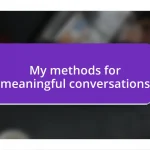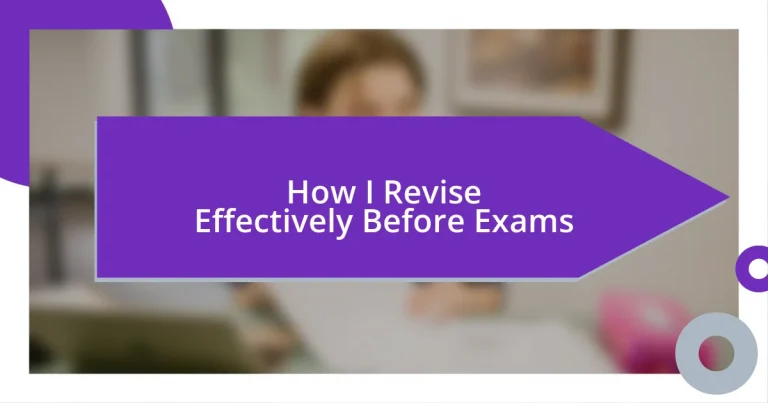Key takeaways:
- Understanding and breaking down study material into key themes enhances comprehension and retention.
- Implementing structured revision schedules and using effective study techniques like active recall and the Pomodoro Technique leads to better exam preparation and reduced anxiety.
- Regular reflection on progress and mistakes is crucial for personal growth and developing a deeper understanding of the material.
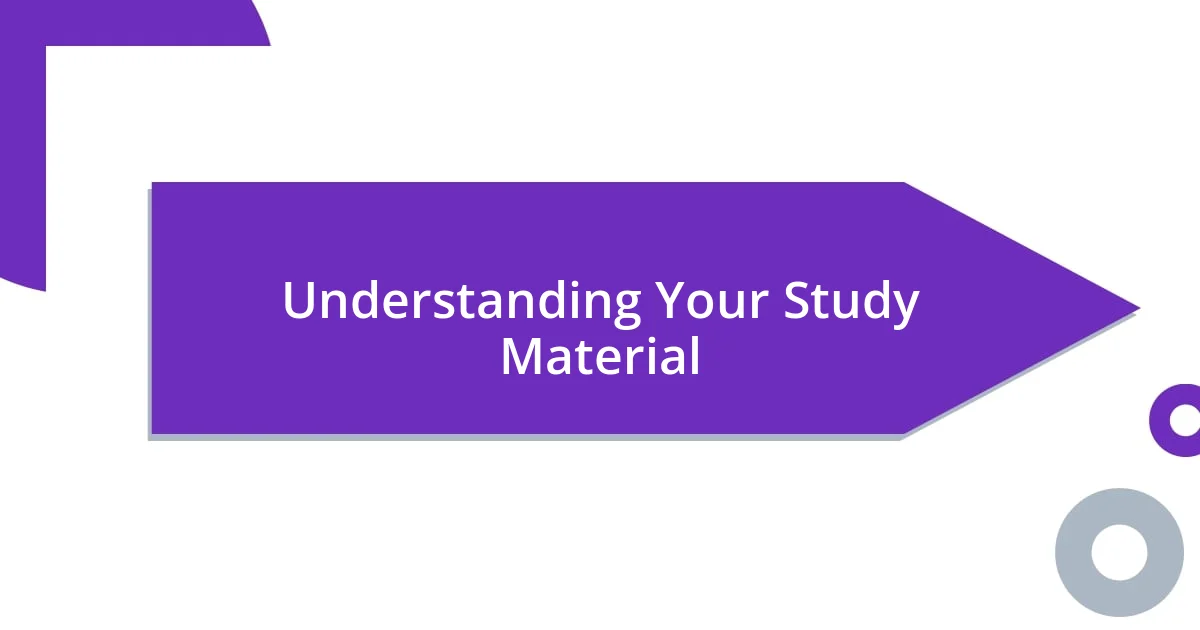
Understanding Your Study Material
Understanding your study material goes beyond just reading and highlighting texts. I remember back in college; I struggled with a dense history textbook that felt like an insurmountable mountain. Instead of just skimming through, I made it a point to break down each chapter into key themes and concepts. This approach turned what seemed overwhelming into manageable sections, making it easier for me to grasp the essential points.
Have you ever tried explaining a topic to someone else? That practice can truly deepen your understanding. I often found that teaching my study material to a friend not only helped reinforce what I knew but also revealed gaps in my understanding. By articulating the concepts aloud, I could see which areas needed more attention, transforming my initial uncertainties into newfound clarity.
In my experience, visual aids can play a crucial role in comprehension. I developed mind maps for complex subjects, connecting ideas and visuals. This not only made studying more engaging but also created a visual roadmap of the material. It’s fascinating how a simple drawing can encapsulate entire chapters and evoke emotions tied to the themes—like a lightbulb moment illuminating the path to mastery. Have you explored different ways to interact with your material? It might just unlock a new level of understanding for you.
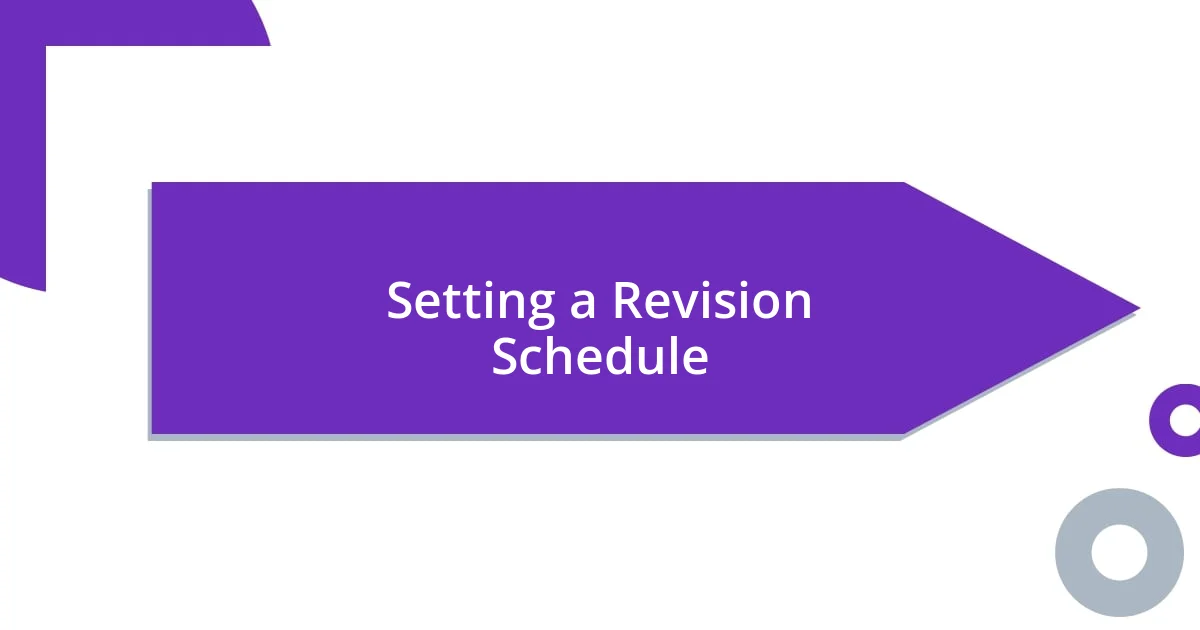
Setting a Revision Schedule
Creating a revision schedule can transform your exam preparation from chaos to clarity. I fondly recall a time in my university days when I decided to approach my revision with a plan. I used a simple calendar to map out my study sessions, which helped me allocate specific times for each subject. This structure not only kept me organized but also ensured I dedicated adequate time to the areas I found challenging.
To create your revision schedule, consider these key steps:
- Assess your subjects: Identify which topics you find most difficult and prioritize them in your schedule.
- Set realistic goals: Break down your study material into manageable chunks and set achievable goals for each session.
- Incorporate breaks: Don’t forget to schedule short breaks to recharge your mind; I found that a five-minute walk or a quick snack improved my focus.
- Be consistent: Stick to your schedule as much as possible, but remain flexible; life happens, and that’s okay.
- Review regularly: Set aside time at the end of each week to review what you’ve learned, which reinforces your knowledge and helps identify any gaps.
By following these strategies, you’ll find yourself not just preparing for exams, but genuinely understanding the material. I remember the sense of accomplishment I felt as I ticked off my study goals — it turned study anxiety into a manageable, even enjoyable, journey.
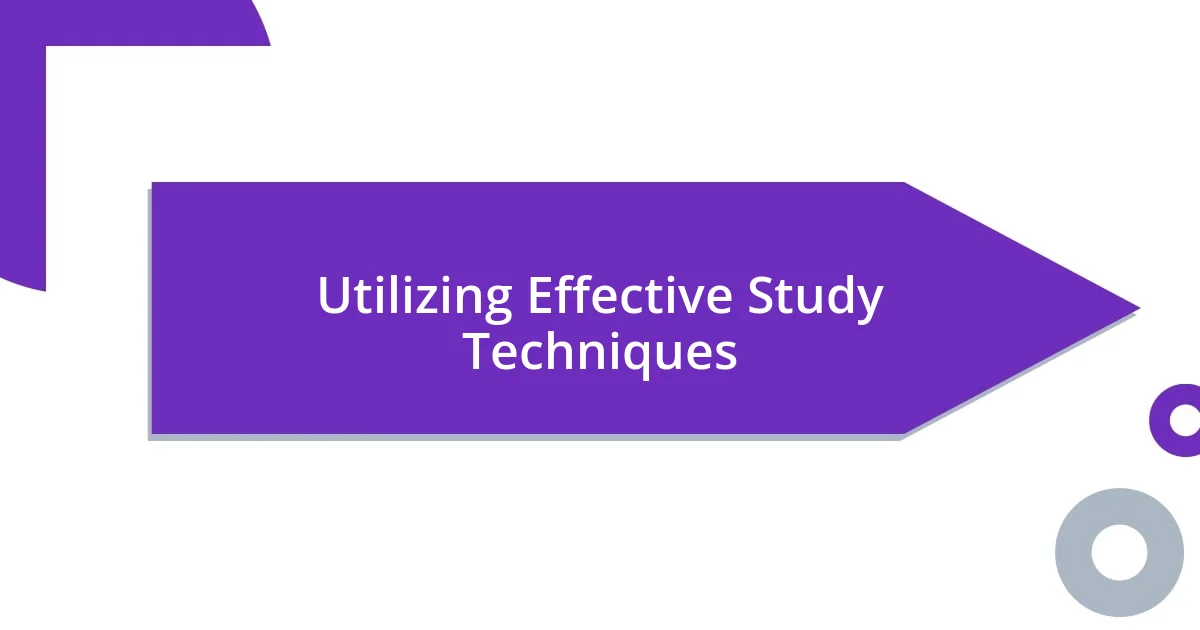
Utilizing Effective Study Techniques
Utilizing different study techniques can significantly enhance your learning experience. One method that’s always resonated with me is active recall. I vividly remember a time when I was cramming for a biology exam and decided to quiz myself using flashcards. It was a turning point; instead of passively reading through my notes, the process of retrieving information actively engaged my brain. Do you ever find that simply reading can lead to wandering thoughts? I certainly did, and that’s why active recall transformed my revision from a boring chore into an interactive challenge.
Another technique that I swear by is the Pomodoro Technique. This involves studying in focused bursts of about 25 minutes, followed by a five-minute break. I once used this method while preparing for a series of back-to-back exams. Surprisingly, I found that these short bursts kept my energy levels high and my attention sharp. Have you noticed how fatigue can creep in during long study sessions? Those mini-breaks helped me recharge, making each study period feel less daunting and more productive.
Lastly, I can’t stress the power of diverse study materials enough. I loved mixing up my resources—textbooks, videos, and online quizzes. In my final year, I stumbled upon a series of engaging YouTube tutorials that explained complex concepts in a fun way. It felt like I had discovered a treasure trove of information! Have you explored various mediums? They can make even the driest topics come to life and cater to different learning styles. Variety really is the spice of study life!
| Study Technique | Description |
|---|---|
| Active Recall | Engaging with material by quizzing yourself, enhancing memory retention. |
| Pomodoro Technique | Studying in short bursts with breaks to maintain focus and prevent burnout. |
| Diverse Study Materials | Using various formats (videos, textbooks, quizzes) to enrich learning and understanding. |
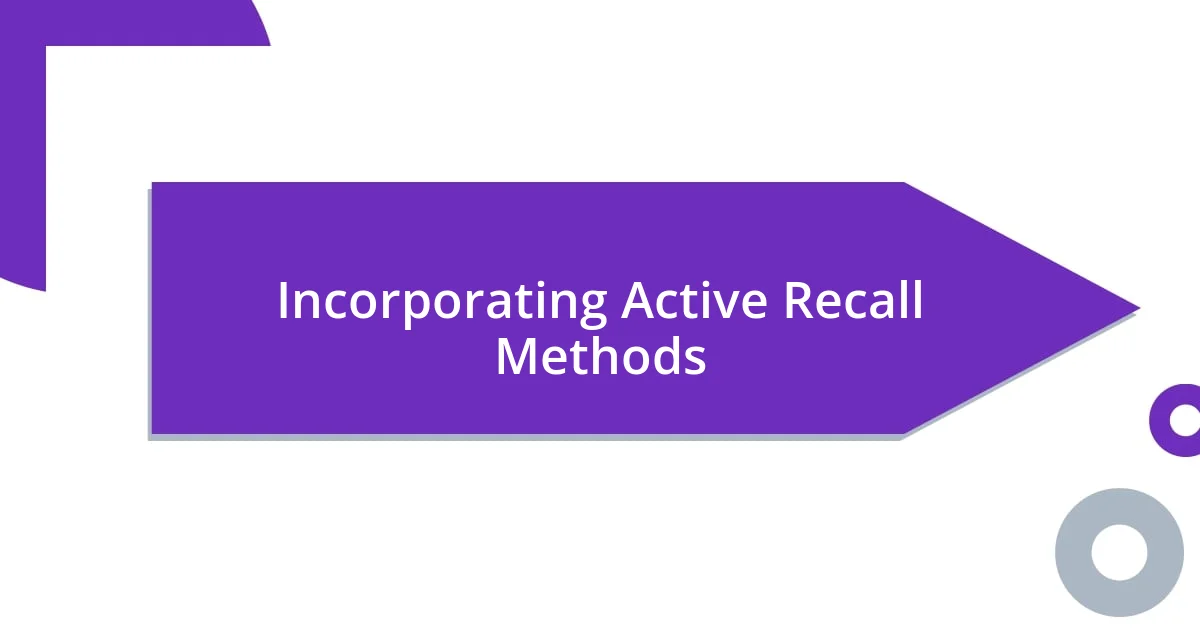
Incorporating Active Recall Methods
Active recall has been a game-changer in my study routine. I remember sitting at my desk with a stack of flashcards, each one a little challenge waiting to be solved. It felt exhilarating to take that leap from just reading to actively pulling information from my brain. Have you ever felt that rush when you finally remember something you thought you’d forgotten? I can assure you, it’s one of the most satisfying feelings during exam prep.
One of my favorite experiences with active recall happened while studying for a history exam. I created a quiz with key events and dates, and instead of just reading through my notes, I forced myself to retrieve that knowledge. Believe me, the more I practiced, the less I relied on my notes, which built my confidence significantly. It was as if I was transforming from a passive learner into an active participant in my education. Isn’t it incredible how engaging your brain can lead to long-lasting retention?
Additionally, I often find myself revisiting material through teaching it to someone else. When I had a study buddy, we’d take turns asking each other questions. Not only did I reinforce my own understanding, but watching my partner grasp concepts gave me immense joy. Have you experienced that moment when you explain something, and the light bulb goes on for someone else? It’s one of the best feelings, proving that active recall doesn’t just help you learn, but it also fosters a collaborative spirit.
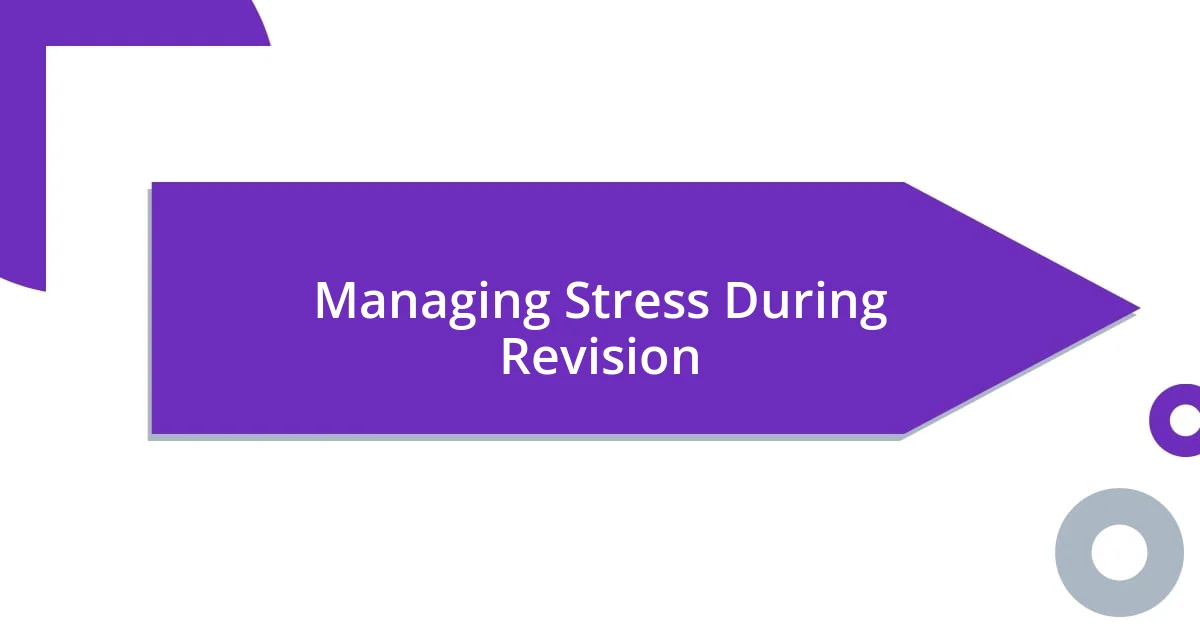
Managing Stress During Revision
Managing stress during revision is essential for effective learning. For me, one of the best ways to manage stress is to create a structured study plan. When I began mapping out my study schedule before exams, I found that having a clear outline of what to cover each day significantly reduced my anxiety. Have you ever felt overwhelmed by the sheer volume of material? I know I have, and breaking it down into smaller, manageable tasks made the process feel less daunting.
In addition to planning, incorporating relaxation techniques throughout my study sessions has been a game-changer. Once, during a particularly stressful week of preparing for final exams, I discovered the benefits of deep breathing exercises. I would take a five-minute break to practice inhaling deeply, holding it for a few seconds, and then exhaling slowly. Surprisingly, this simple practice not only calmed my nerves but also cleared my head and helped me refocus. Has a simple technique ever turned your mood around during a high-pressure moment? I can wholeheartedly say that a few minutes of mindfulness transformed my stress into calm focus.
Lastly, don’t underestimate the power of physical activity. There was a time when I felt like I was drowning in revision, and I decided to run a quick lap around the block. To my amazement, those endorphins lifted my spirits and renewed my concentration. It made me realize how our bodies can impact our mental state—something I had underestimated before. Have you tried stepping away from your studies for a bit of movement? Trust me, even a short walk can provide the physical and mental reset needed to power through your revision!
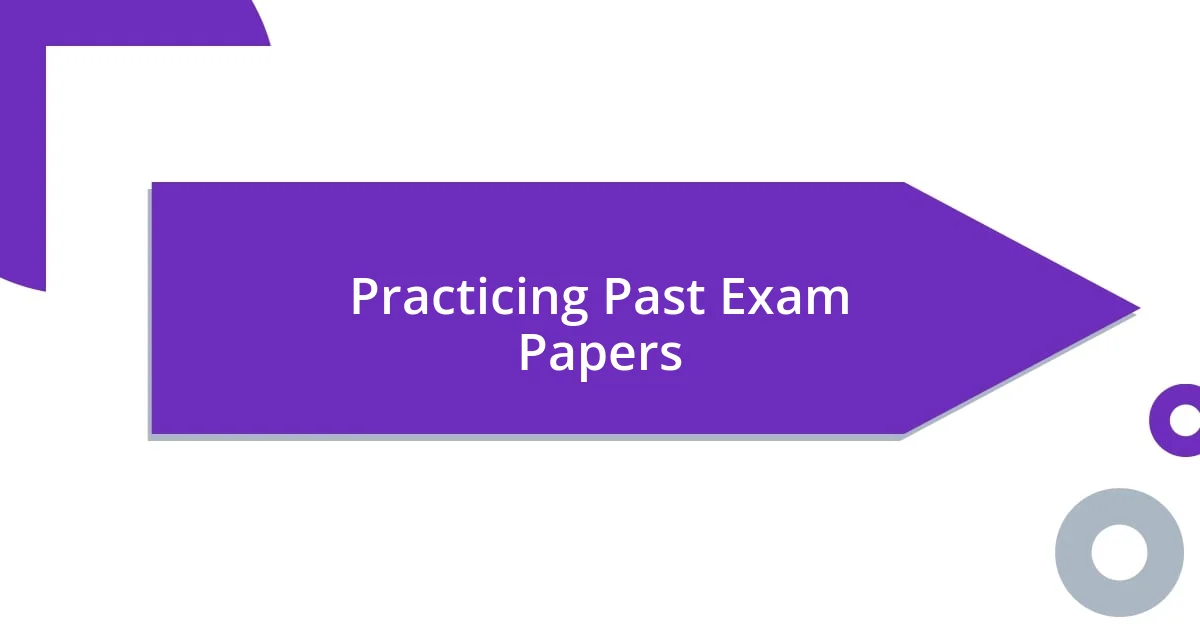
Practicing Past Exam Papers
Practicing past exam papers has been a cornerstone of my exam preparation strategy. When I first began incorporating this practice, I was pleasantly surprised by how familiar the questions felt. I remember sitting down with a stack of old papers, my heart racing and my palms a bit sweaty, thinking about how this might just be another form of stress. But then, as I tackled each question, I discovered that my nerves gave way to a sense of clarity. Have you ever experienced that moment when something challenging transforms into an opportunity for growth?
As I worked through these papers, I noticed an incredible pattern: the more I practiced, the better I understood the exam format. One day, while practicing for a math exam, I encountered a question that previously would have left me stumped. However, because I had already seen similar problems, I felt confident jumping right in. It was like a light bulb went off, and I could almost hear my brain saying, “You know this!” How empowering is that feeling when you realize your preparation is truly paying off?
Moreover, analyzing my mistakes became a routine task that I genuinely appreciated. After each practice session, I would reflect on what went wrong and why. I found it helpful to jot down common pitfalls in a notebook dedicated solely to my learning process. Once, I spent an evening going through my missteps from a previous English exam paper. I laughed at myself for overlooking some simple grammar rules, but then it hit me: recognizing these gaps allowed me to improve. Have you taken the time to learn from your errors during revision? Embracing those lessons not only boosted my performance but also transformed the way I approached each subject area, turning anxiety into actionable steps forward.
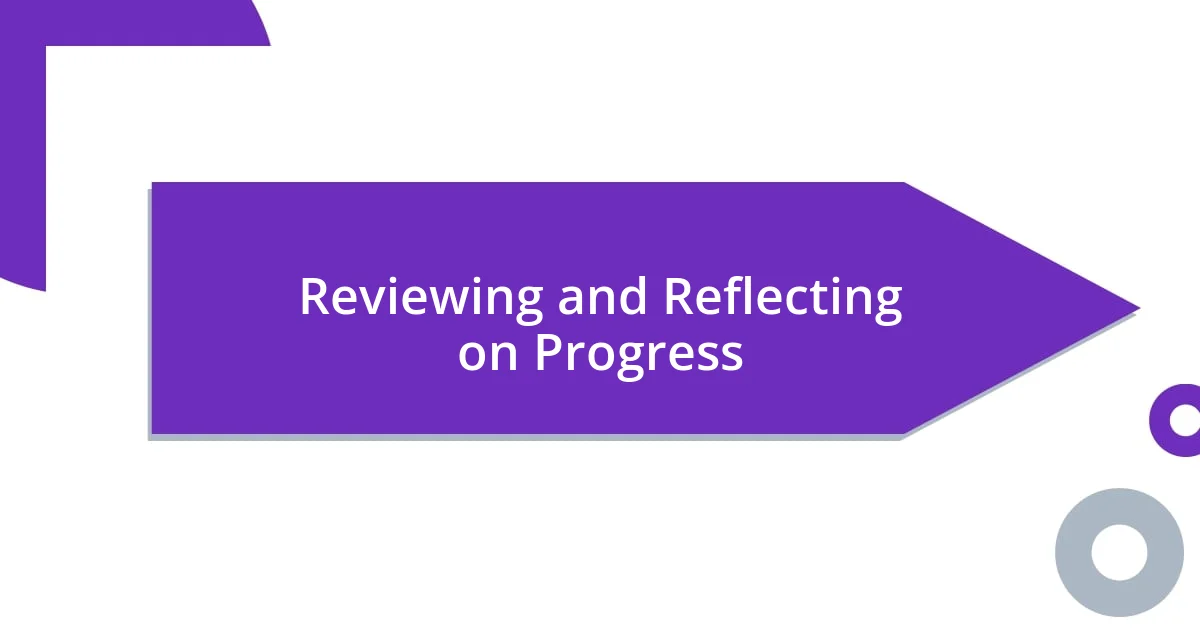
Reviewing and Reflecting on Progress
Reflecting on progress during revision feels like looking into a mirror that shows not just my academic growth, but also my personal development. One time, after a particularly intense study session for my history exam, I sat down with my notes to assess what I had truly absorbed. To my surprise, I realized I could recall details that I’d thought were slipping away. That moment reminded me that, sometimes, it’s easy to underestimate how much we actually learn until we take a step back to reflect. Have you ever had that realization where you felt proud of how far you’ve come?
Reviewing my completed study tasks is another practice that has become invaluable. I learned to savor those fleeting moments of accomplishment, like finishing a chapter or mastering a complex concept. Once, after wrapping up a daunting topic on political theories, I treated myself to my favorite snack. That small reward after a productive review session highlighted the importance of celebrating victories, no matter how small. Have you noticed how even minor achievements can reignite your motivation?
Ultimately, I find that reflecting on what was challenging can be more enlightening than simply revising. After grappling with an especially tricky math problem, I took a moment to jot down my feelings of frustration and breakthroughs. When I flipped through those notes later, it was enlightening to see how my mindset shifted from confusion to clarity. Isn’t it fascinating how our struggles can actually shape our learning journey? Recognizing those challenges as learning opportunities has helped me evolve not just as a student, but as a lifelong learner.









